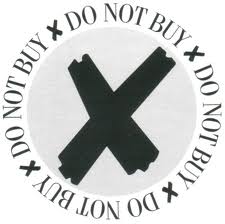
“Boycott”, according to Wikipedia, is “an act of voluntarily abstaining from using, buying, or dealing with a person, organization, or country as an expression of protest, usually for political reasons.”
Of course many groups boycott for a number of reasons.
- PETA boycotted KFC as an animal rights issue.
- After the Deep Water Horizon oil spill, many consumers boycotted BP.
- Gay and lesbian groups boycotted advertisers of the “Dr. Laura” talk show.
- The American Family Association boycotted Home Depot because of their involvement in promoting gay marriage legislation.
- Gun owners have boycotted the Rosie O’Donnell talk show.
It seems that if a group cannot get a business to willingly change their objective practices, they may be able to affect that change by hitting in the pocketbook. It is change by coercion, not agreement.
Biblical boycott?
I have never been a big boycotter, but an event that happened 2000 years ago in Ephesus (Acts 19:23-41) has caused me to scratch my head. When the Apostle Paul’s preaching began hurting the profits of the silversmiths — whose livelihood depended on creating silver shrines to the goddess Artemis — they started a riot which nearly cost Paul his life. According to the ringleader Demetrius, “this man Paul has persuaded many people that handmade gods aren’t really gods at all.” (see Acts 19:26). Obviously Paul’s preaching was making a difference: fewer people were purchasing the silver shrines and the silversmiths were seeing their profits diminish.
Was Paul boycotting the silversmiths?
If Paul specifically instructed his hearers to quit buying the silver shrines, he was boycotting. However, if his listeners quit purchasing the shrines because they had come to believe that they were idols – and therefore wrong – then it wasn’t a boycott. The difference is setting out to hurt an industry because you don’t agree with what they do or having such an influence with the consumers that they choose not to buy the offending products. My guess is that Paul did not intentionally harm the silversmiths for producing the shrines; their revenue loss was a side effect of Paul’s message, not a direct effect from boycotting.
Should Christians boycott?
All of this brings me back to my title question. Sorry to disappoint, but I don’t have a clear answer. The good side of boycotting is that it draws attention to relevant issues that we would often otherwise ignore. A successful boycott will sometimes help the advertiser or merchant realize that his actions offend a group of people, and that he is best served by changing that action. On the other hand, boycotters often give the impression of being extremists or even kooks. As a Christian boycotter, I could easily be dismissed as “another one of those.”
Direct or Indirect Approach?
I believe the best way to change the world is to bring people to Christ. Once a person is changed on the inside, he will automatically begin making changes which will hurt the pocketbooks of the offending businesses. The “Men’s Club” near my home town, for example, would die a natural death if the men who frequent it would come to Christ and begin loving their wives as they should.
But here I equivocate, for I know myself: I have a tendency to allow this “indirect” approach dull my conscience on specific issues. Perhaps the direct approach — some healthy boycotting, especially on deep felt issues such as abortion, would be better than turning my head.
What do you think?

Leave a Reply